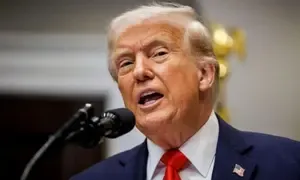South Korea Urges Contingency Measures Amid US Tariff Ambiguity

Synopsis
Key Takeaways
- Choi Sang-mok emphasizes the need for contingency plans.
- Monitoring of financial markets is crucial amidst U.S. tariff uncertainties.
- Household debt-to-GDP ratio shows a declining trend.
- The U.S.-China tariff conflict poses risks to South Korea's economy.
- Officials must remain vigilant in managing financial scenarios.
Seoul, April 11 (NationPress) Finance Minister Choi Sang-mok directed officials on Friday to formulate contingency plans to effectively address uncertainties arising from the U.S. administration's tariff policies and enhance monitoring of financial markets.
Choi made this request during a meeting focused on macroeconomic challenges, attended by Bank of Korea (BOK) Governor Rhee Chang-yong, along with leaders from the Financial Services Commission and the Financial Supervisory Service, as reported by the Ministry of Economy and Finance, according to YOnhap news agency.
"Although the U.S. government has provided a 90-day grace period regarding reciprocal tariffs, uncertainties persist due to the escalating tariff conflict between the U.S. and China and the imposition of specific tariffs," Choi stated.
"Relevant agencies must remain alert and develop response plans for various scenarios. There is also a need to enhance monitoring of the stock, government bonds, foreign exchange, and capital markets," he added.
U.S. President Donald Trump announced a 90-day halt on newly implemented reciprocal tariffs on imports from South Korea and other trading partners shortly after the comprehensive scheme was activated on Wednesday.
Nevertheless, his blanket 10 percent tariff on all imports remains effective, in addition to 25 percent tariffs on steel, aluminum, and automobiles entering the United States.
The tariff dispute between the United States and China has intensified, raising concerns about its potential effects on South Korea's trade-dependent economy.
Trump has continued to escalate his trade threats against China, with tariffs on certain products reaching as high as 145 percent, while Beijing has retaliated with counter-tariffs up to 84 percent on American imports.
Additionally, Choi and the officials assessed household borrowing and emphasized the importance of close monitoring and timely interventions to manage debt levels.
As per government data, South Korea's household debt-to-GDP ratio was recorded at 90.1 percent in 2024, continuing its steady decline since 2021 when it peaked at a historic high of 98.7 percent.










